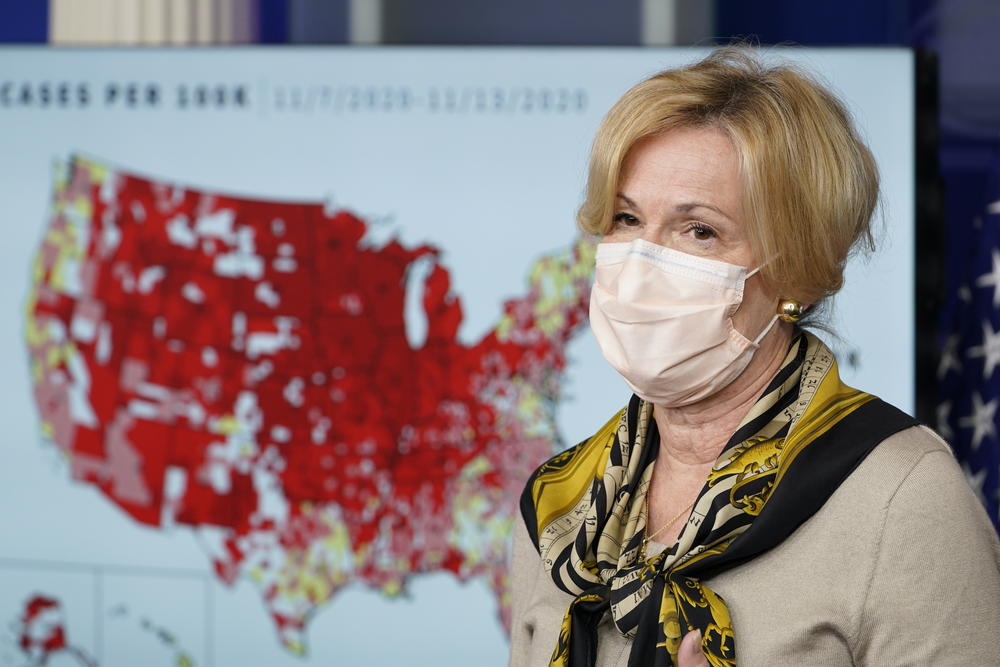
Caption
White House Coronavirus Response Coordinator Dr. Deborah Birx speaks during a news conference with the coronavirus task force at the White House in Washington, Thursday, Nov. 19, 2020.
Credit: Susan Walsh/AP

White House Coronavirus Response Coordinator Dr. Deborah Birx speaks during a news conference with the coronavirus task force at the White House in Washington, Thursday, Nov. 19, 2020.
Georgia remains in the red zone for COVID-19 cases, with the 48th highest rate in the country, and a test positivity rate between 8.0% and 10.0%, with the 39th highest rate in the country,
according to the latest White House report
dated Nov. 22.
Fulton, Gwinnett and DeKalb counties had the highest number of new cases over the last three weeks, representing more than a quarter of the state's new cases, and 66% of all counties in Georgia have moderate or high levels of community transmission.
RELATED: Emory Doctor Calls Again For Mask Mandate; Says Nation Has 'Leadership Vacuum'
"In states with aggressive mitigation, we are beginning to see the impact of that mitigation despite the cooling weather," the report states.
That means leaders should encourage widespread testing alongside public safety recommendations to wear face masks and avoid crowded places such as bars and gyms.
If there is already a “hot spot” in the coming surge, it’s in northwest Georgia. There, in a swath of counties running from Carroll County to Murray County, per capita COVID-19 cases are growing about three times as fast as in Fulton County.
That footprint also describes the heart of Georgia’s 14th U.S. Congressional District, now represented by U.S. Representative-elect Marjorie Taylor Greene, who has been vocally opposed to wearing masks for COVID-19 prevention.
Dr. Gary Voccio, the health director of the Northwest Georgia Health District, blamed the explosive growth on people just getting tired of basic prevention steps such as mask wearing and the fact that the virus has saturated communities.
“It’s in all kinds of venues: Hamburger joints, physician's offices, long-term care facilities especially... trucking firms, restaurants,” Voccio said. “I mean, this is just widespread community transmission of this virus.”
Voccio said local hospitals have enough ventilators and other needed supplies for now, but he is very worried about the near future.
“I really think we're going to we're going to see even worse numbers in the next few weeks post holiday and into early 2021,” Voccio said.
Gov. Brian Kemp last week renewed the current COVID-19 restrictions through Nov. 30.
At the time, Kemp said the state had deployed over 300,000 rapid tests to communities across the state, stockpiled a sixty-day supply of personal protective equipment (PPE), and worked with hospitals and nursing homes to provide the medical staff needed to treat COVID-19 patients.
"Continue to wash your hands, wear a mask, watch your distance, follow public health guidance, and get a flu shot," Kemp said. "By taking these simple steps, we will protect lives — and livelihoods."
Kemp and Georgia Department of Public Health Commissioner Dr. Kathleen Toomey updated residents this afternoon, reminding them to stay vigilant ahead of the Thanksgiving holiday.
They said to continue wearing face masks, social distancing and to consider staying home this weekend.
A recent negative COVID-19 test is not enough to ensure one is free of infection, Toomey said.
"If you get tested today and you're negative, it does not mean that you will not be positive and in a day or two or three," she said.